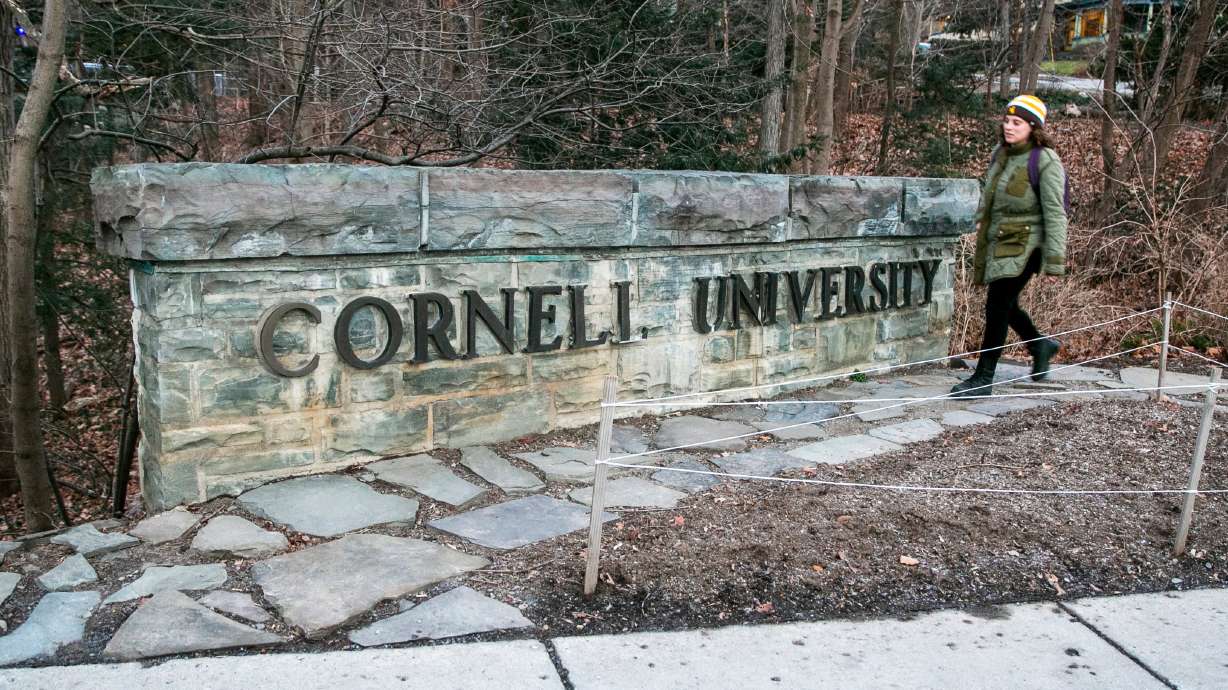Estimated read time: 5-6 minutes
This archived news story is available only for your personal, non-commercial use. Information in the story may be outdated or superseded by additional information. Reading or replaying the story in its archived form does not constitute a republication of the story.
SALT LAKE CITY — Twice during her senior year at Cornell University, Talia Dror has testified before Congress.
The first time was after Hamas-led militant groups launched a surprise attack on Israel on Oct. 7.
"Eight months ago, I sat in these very chambers and described how, directly after the Oct. 7 attacks, my campus erupted in celebration. I explained how the antisemitic environment fostered by pro-Hamas students, professors and administrators led to a Cornell student threatening to bomb our kosher dining hall and slaughter every Jew on our campus. I am here today to tell you that since then, nothing has changed," Dror told members of the House Committee on Ways and Means on June 13.
"Blatant violations" of the university's code of conduct persist, she said, which were "appeased and rewarded by my university. Now, these violations have been exposed for what they truly are: expressions not just of antisemitism, but of a burning hatred for the United States itself."
When Cornell University President Martha E. Pollack sent an email informing the campus that protesters had voluntarily taken down their encampment, she noted that while it was a clear violation of university policies, the participants were peaceful and nonviolent. If no other violations of university policy occurred, "we are able to pause on issuing additional suspensions and disciplinary referrals," she wrote.
Dror said the email "was actually the moment I decided not to attend my graduation. This is laughable. I spent the past eight months being called a Nazi because I believe in the existence of the state of Israel and for her (Pollack) to protect students, falsely mischaracterizing Israel defending itself as a genocide, in the name of trivializing the Holocaust, is laughable and shameful," she said.
Pollack has since stepped down as president, which means Harvard, Yale, the University of Pennsylvania and Cornell are seeking new leadership.
'Clearly violating the civil rights of its students'
Dror was among five witnesses that testified to the House Ways and Means Committee during a hearing on "antisemitism, radical faculty and failures of university leadership."
Moving into fall term, some committee members wondered aloud what steps Congress or the executive branch could take to check antisemitism on campus.
Rep. Drew Ferguson, R-Ga., said historically, some universities' policies discriminated against admitting African American students.
"I take you back to the case of the United States vs. Bob Jones University, where, because of their racially discriminatory policies, their tax-exempt status was removed," he said. In that case, the private, nonprofit university lost its tax exemption after a 13-year battle with the IRS over whether the university's policies against interracial dating precluded it as a nontaxable religious educational institution.
The Supreme Court held that the racially discriminatory policies and practices did not serve a legitimate public purpose and therefore precluded tax-exempt status.
"Keep in mind, I'm a dentist playing lawyer up here, so you'll have to excuse my my very simplistic method here, but it seems that we're in very similar territory right now, where you have you have universities that are clearly violating the civil rights of its students," Ferguson said.
'That's a political purpose'
One witness, Shai Davidai, assistant professor in Columbia University's Business School, was asked what he believed would happen if Congress cut off federal funds to any university where incidents of antisemitism have proliferated.
"I would say, that even before you cut it off, their knees will start shaking and change will happen. We have to remember Columbia University is the largest private landlord in New York City, and it is a tax-exempt largest private landlord," Davidai said, noting the university owns the land of Rockefeller Center, most of Morningside Heights and many properties in Harlem.
"If only the thought of losing that tax exemption would pass through their minds, you would see no more antisemitism, you won't see misdoing of anything on campus because these universities, and I've spent a lot of time in these universities, they're not elite universities, (they're) very expensive universities. All they care about is money and PR, and if you start playing with that, things will change."
Dror said she "couldn't agree more."
Dror thanked Ways and Means Committee Chairman Jason Smith, R-Mo., for his investigation into conditions on campuses.
"Every single positive action I've seen out of Cornell in the past seven months has been the result of the pressure of this committee. I have a lot to be grateful for, but I do think that you will see tangible results when you place pressure on these universities that think that they are allergic to any form of punishment," she said.
Jonathan Pidluzny, director of the higher education reform for the America First Policy Institute, said the premise behind colleges' and universities' tax exemption status is that they are organized and operated exclusively for educational purposes.
"Universities don't look today what they look like 50 years ago. They have $4 or $5, $6 billion budgets. They manage wealth equivalent to a large hedge fund. They sell a lavish college experience, luxury dorms and gourmet food subsidized by taxpayers. They operate multimillion- or billion-dollar research labs. They hire teams of lobbyists. Some have hundreds of millions in foreign revenue," he said.
Pidluzny continued, "They run DEI programs that understand their purpose as being to reengineer American society. That's a political purpose that is not an educative function. Elite universities are simply no longer driven by truth-seeking or education as their guiding ethos."










